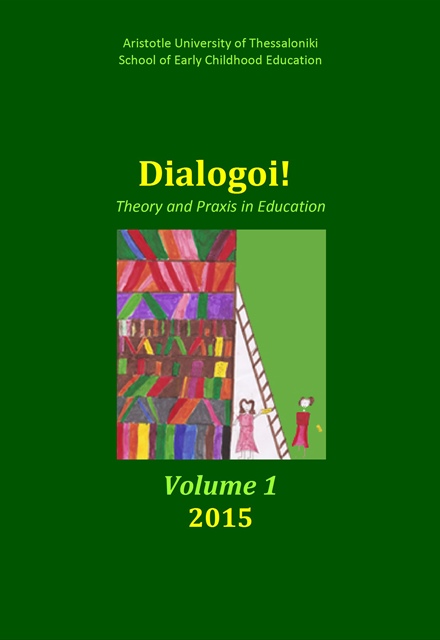Assessing quality in kindergarten, through the use of Early Childhood Environmental Rating Scale (ECERS-R)

Published:
Feb 1, 2016
Keywords:
Ecers-R quality in early childhood education environmental rating scales
Abstract
This paper presents the results from the application of early childhood environmental rating scale (ECERS-R) in 40 kindergarten classes. The survey used the translated and adapted to the Greek reality version (Botsoglou & Kakana, 2013) and its implementation, it became by 10 specially trained investigators.
The results of the application of the scale, do not allow us to shape an encouraging picture of the quality of pre-school classes; however arise according to our view some interesting points which if taken under consideration can upgrade the quality of the daily practices in Greek kindergarten.Article Details
- How to Cite
-
Botsoglou, K., & Kakana, D. M. (2016). Assessing quality in kindergarten, through the use of Early Childhood Environmental Rating Scale (ECERS-R). Dialogoi! Theory and Praxis in Education, 1, 4–14. https://doi.org/10.12681/dial.1990
- Issue
- Vol. 1 (2015)
- Section
- Special Theme

This work is licensed under a Creative Commons Attribution-NonCommercial-ShareAlike 4.0 International License.
Authors who publish with this journal agree to the following terms:
- Authors retain copyright and grant the journal right of first publication with the work simultaneously licensed under a Creative Commons Attribution Non-Commercial License that allows others to share the work with an acknowledgement of the work's authorship and initial publication in this journal.
- Authors are able to enter into separate, additional contractual arrangements for the non-exclusive distribution of the journal's published version of the work (e.g. post it to an institutional repository or publish it in a book), with an acknowledgement of its initial publication in this journal.
- Authors are permitted and encouraged to post their work online (preferably in institutional repositories or on their website) prior to and during the submission process, as it can lead to productive exchanges, as well as earlier and greater citation of published work (See The Effect of Open Access).
Downloads
Download data is not yet available.
References
Botsoglou, K., & Andreou, E. (2004). Children’s privacy behavior in kindergarten during spontaneous play activities. International Journal of Learning, 11, 323-327.
Bredekamp, S., & Copple, C. (1997). Developmentally appropriate practice in early childhood. Washington, DC: NAYEC.
Calder, P. (1995). Using the Early Childhood Environment Rating Scale as a measure to make cross-national evaluations of quality: advantages and limitations. Paper presented at the European Conference on the Quality of Early Childhood Education (5th, Paris, France, September 7-9, 1995).
Γερμανός, Δ. (1993). Χώρος και διαδικασίες αγωγής. Αθήνα: Gutenberg.
Δαφέρμου, Χ., Κουλούρη, Π., & Μπασαγιάννη, Ε. (2006). Οδηγός Νηπιαγωγού, εκπαιδευτικοί σχεδιασμοί, δημιουργικά περιβάλλοντα μάθησης. Αθήνα: ΥΠΕΠΘ, ΟΕΔΒ.
Dickinson, D. K., & Sprague, K. E. (2001). The nature and impact of early childhood care environments on the language and early literacy development of children from low-income families. Στο S. B. Neuman & D. K. Dickinson (Eds.), Handbook of Early Literacy Research (σσ. 263–280). New York: Guilford.
Harms, T., Clifford, R. M., & Cryer, D. (1998). Early Childhood Environment Rating Scale-Revised. New York, NY: Teachers College Press.
Heckman, J. J. (2002). Invest in the very young. Chicago, IL: Ounce of Prevention Fund and University of Chicago, The Harris School.
Koralek, D. G., Colker, L. J., & Dodge, D. (1995). The what, why, and how of high-quality early childhood education: a guide for on-site supervision (Rev. Eds). Washington, DC: National Association for the Education of Young Children.
La Paro, K. M., Pianta, R. C., & Stuhlman, M. (2004). The classroom assessment scoring system: Findings from the pre-kindergarten year. The Elementary School Journal, 104(5), 409-426.
Μανωλίτσης, Γ. (2004). Η εμπλοκή των γονέων στην προσχολική αγωγή. Το Βήμα των Κοινωνικών Επιστημών, 10(38), 121-145.
Μπότσογλου, Κ., & Κακανά, Δ. (2010). Οι κλίμακες αξιολόγησης ως μέσο βελτίωσης της ποιότητας στην προσχολική εκπαίδευση. Στο Δ. Γερμανός & Μ. Κανατσούλη (Επιμ.), Η Αλλαγή στην Εκπαίδευση (σσ. 22-55). Θεσσαλονίκη: Αφοί Κυριακίδη.
Μπότσογλου, Κ., & Κακανά, Δ. (2013). Κλίμακα αξιολόγησης της ποιότητας στην προσχολική εκπαίδευση. ECERS-R. Θεσσαλονίκη: Κυριακίδη.
Nabuco, Μ., & Sylva, K. (1995). Comparisons between ECERS ratings of ιindividual pre-school center and the results of target child observations: do they match or do they differ? Paper presented at the European Conference on the Quality of Early Childhood Education (5th, Paris, France, September 7-9, 1995).
Ogefelt, A. D. (1995). The E.C.E.R.S. as a base for research and development of quality in day care centers in Sweden. Paper presented at the European Conference on the Quality of Early Childhood Education (5th, Paris, France, September 7-9, 1995).
Perlman, M., Zellman, G. L, & Le, V. (2004). Examining the psychometric properties of the early childhood rating scale-revised (ECERS-R). Early Childhood Research Quarterly, 19(3), 398–412.
Ρεκαλίδου, Γ. (2009). Η εφαρμογή του Δ.Ε.Π.Π.Σ. και η συνεργασία νηπιαγωγείου-οικογένειας σε αγροτικές και αστικές περιοχές. Οι απόψεις των νηπιαγωγών και των γονέων. Κίνητρο, 10, 99-114.
Sakellariou, M., & Rentzou, K. (2007). Types of parental involvement in Greek preschool settings: a case study. International Journal of Learning, 14, 33-40.
Sheridan, S. (2007). Dimensions of pedagogical quality in preschool. International Journal of Early Years Education, 15(2), 197-217.
Smith, A. B. (1996). Is Quality a Subjective or Objective Matter? Στο A. B. Smith & N. J. Taylor (Eds.), Assessing and Improving Quality in Early Childhood Centres (σσ. 81–90). Dunedin: Children's Issues Centre.


